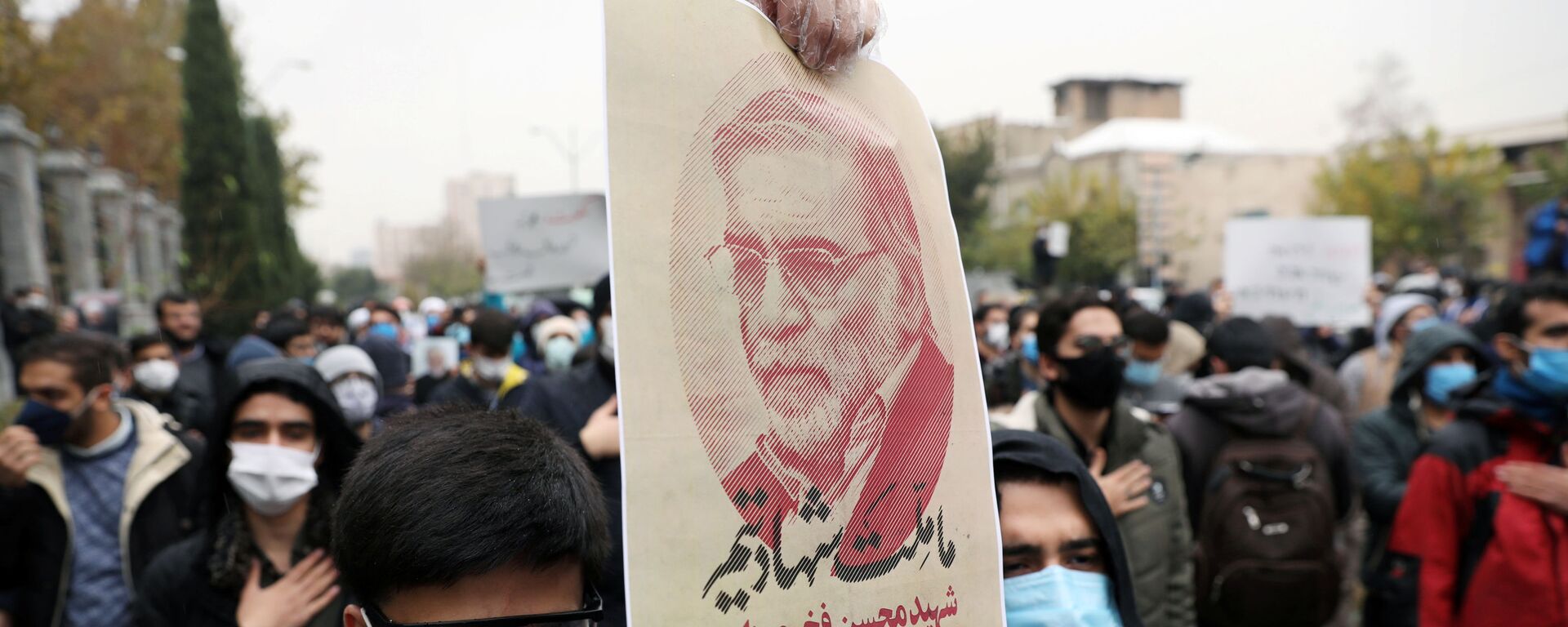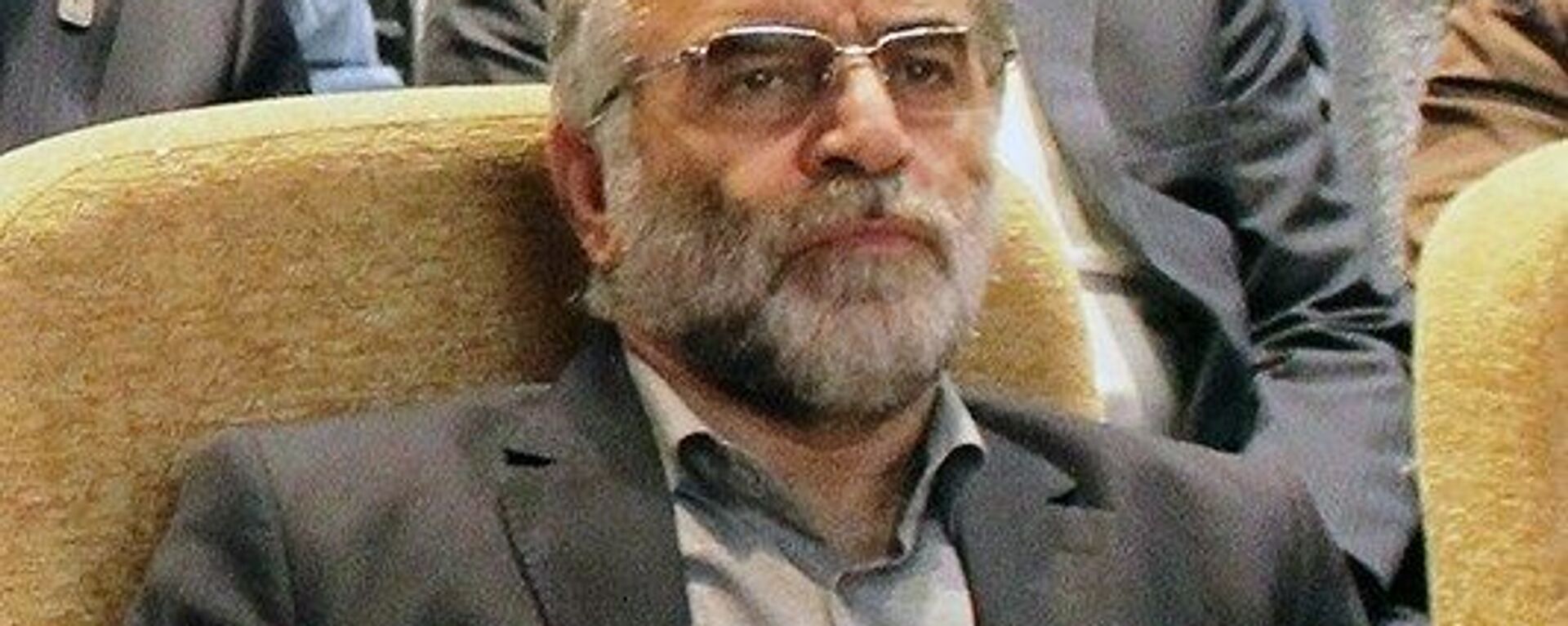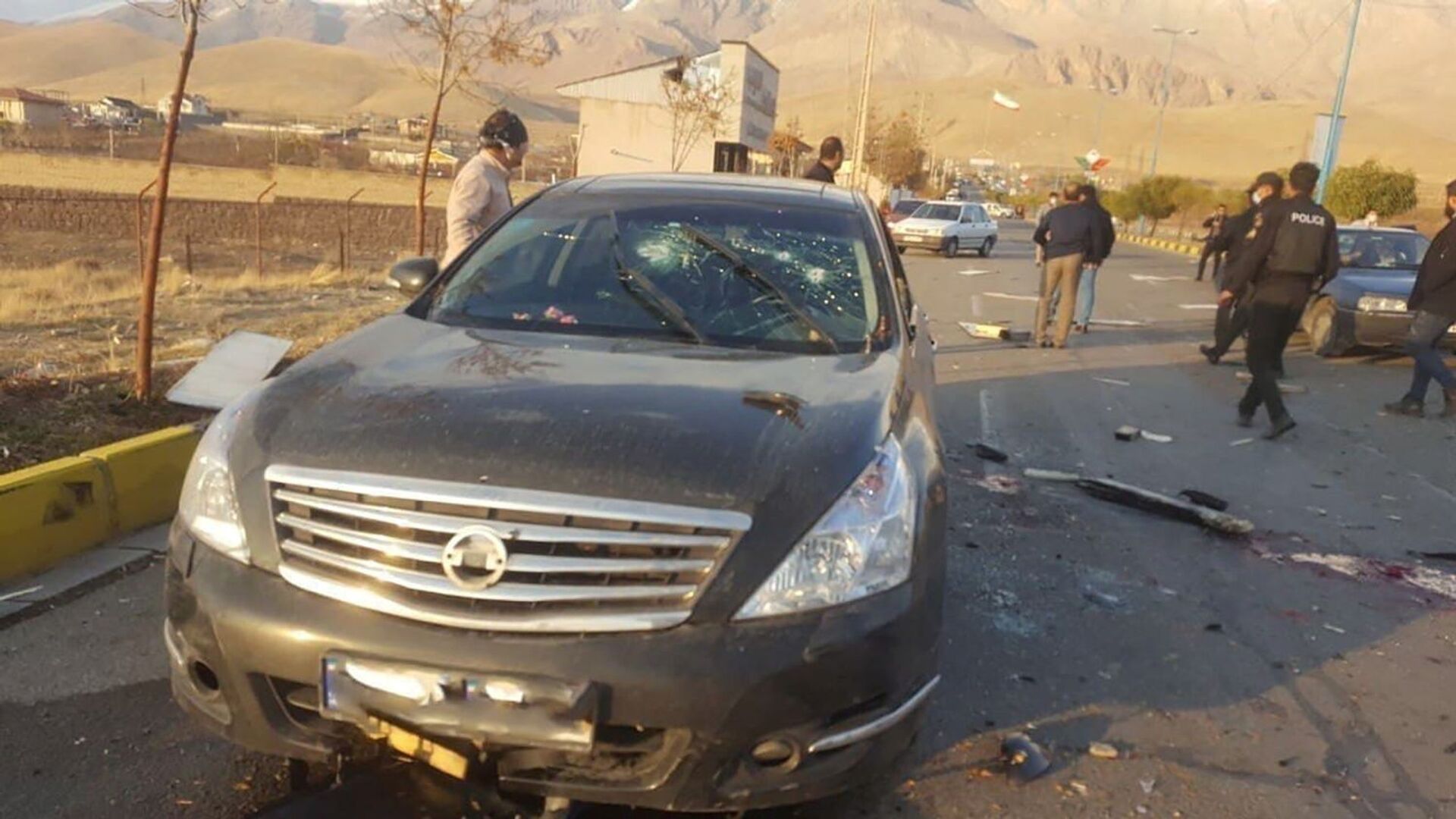https://sputnikglobe.com/20210920/iran-dismisses-nyts-account-of-mossad-assassination-of-nuclear-scientist-as-just-newspaper-report-1089236278.html
Iran Dismisses NYT’s Account of Mossad Assassination of Nuclear Scientist as Just ‘Newspaper Report’
Iran Dismisses NYT’s Account of Mossad Assassination of Nuclear Scientist as Just ‘Newspaper Report’
Sputnik International
Iranian nuclear scientist Dr. Mohsen Fakhrizadeh was killed about 175 km east of Tehran on 27 November 2020, with Tehran blaming Israel, acting in concert with... 20.09.2021, Sputnik International
2021-09-20T11:23+0000
2021-09-20T11:23+0000
2021-09-20T11:34+0000
investigation
assassination
killing
https://cdn1.img.sputnikglobe.com/img/07e4/0b/1b/1081297332_0:0:1500:844_1920x0_80_0_0_b225a5e9b1c32a147e08802980465a3b.jpg
Iranian Foreign Ministry spokesman Saeed Khatibzadeh has dismissed a recent New York Times account of the 2020 assassination Mohsen Fakhrizadeh, characterizing it as a mere “newspaper report.”Khatibzadeh stressed that Iran maintains a “legal commitment and a special commitment to pursue” Fakhrizadeh’s killers, and called the eminent nuclear scientist’s murder “a disgrace for whose who are arrogantly proud of knife stabbings and similar acts.” According to the spokesman, Iran is following a ‘legal path’, as well as ‘intelligence and security paths’, to secure justice for the academic. New Reported DetailsThe Foreign Ministry spokesman’s comments followed the publication of a detailed account by the New York Times citing US, Israeli and Iranian officials, including intelligence officers said to be familiar with the details behind the planning and execution of the assassination. The Times’ account suggests that Fakhrizadeh was killed by a Mossad sniper using a remotely operated rapid-fire machine gun equipped with artificial intelligence and cameras at a specially designated ambush site.NYT’s reporting conflicts with reports that circulated in the early days that followed the murder, which included speculation that the hit was carried out using a large squad of assassins. Fakhrizadeh was said to have died in his wife’s arms after the sniper fired a total of 15 shots at him while he was driving his car on a remote road about 175 km east of Tehran. The scientist was reportedly warned of possible plans to kill him and asked not to travel, but refused to do so out of a desire to continue his lectures at the University of Tehran.Iran’s Supreme National Security Council convened an emergency meeting of senior military commanders in the aftermath of Fakhrizadeh’s death, with senior officials calling the incident a “terrorist act” and calling for revenge at a time and place of Iran’s choosing.The Revolutionary Guards confirmed that the weapon involved in the killing was operated from a distance. Iranian officials almost immediately blamed Israel – which was previously accused of assassination attempts against half a dozen other Iranian nuclear scientists, for Fakhrizadeh’s murder. Israel did not publicly comment, but one senior official speaking to US media grumbled that the world should “thank” Tel Aviv for the killing.Iranian investigators have suspected that Mujahedeen-e-Khalq, a US and Israeli-supported militant group designated as a terrorist organization by Iran, of involvement in the assassination plot. A spokesman for the group denied this allegation.In February, Iranian Intelligence Minister Mahmoud Alavi announced that it had begun the prosecution of the “main perpetrator behind the assassination,” said to a former employee of the Iranian Armed Forces, and that other persons believed to be involved in the conspiracy had also been identified.Fakhrizadeh was one of Iran’s most eminent nuclear scholars, with Supreme Leader Ali Khamenei characterizing him as Iran’s “prominent and distinguished nuclear and defensive scientist.” Israel and its US allies have claimed that the academic was involved in a suspected Iranian nuclear weapons programme. Former Israeli Prime Minister Benjamin Netanyahu singled out Fakhrizadeh as the director of the secret nuke effort in 2018 in a presentation lobbying the Trump administration to pull out of the Iran nuclear deal, calling on the international community to “remember that name.”Iran has vocally denied having any plans to pursue nuclear weapons, and has repeatedly emphasized its opposition to the development, construction, deployment or use of nukes or weapons of mass destruction of any kind anywhere in the Middle East. The Islamic Republic voluntarily eliminated its stocks of chemical weapons in the 1990s before joining the Chemical Weapons Convention in 1997, and did not use them in the 1980s during the war with Saddam Hussein’s Iraq, even as Iraqi forces used neurotoxins against Iranian troops on the battlefield, and against civilians in Iranian cities.
https://sputnikglobe.com/20210918/report-reveals-new-details-of-mossad-assassination-of-top-iran-nuclear-scientist-1089196138.html
https://sputnikglobe.com/20201129/murdered-iranian-scientist-had-been-targeted-by-multiple-israeli-pms-mossad-chiefs-report-alleges-1081309690.html
Sputnik International
feedback@sputniknews.com
+74956456601
MIA „Rosiya Segodnya“
2021
News
en_EN
Sputnik International
feedback@sputniknews.com
+74956456601
MIA „Rosiya Segodnya“
Sputnik International
feedback@sputniknews.com
+74956456601
MIA „Rosiya Segodnya“
investigation, assassination, killing
investigation, assassination, killing
Iran Dismisses NYT’s Account of Mossad Assassination of Nuclear Scientist as Just ‘Newspaper Report’
11:23 GMT 20.09.2021 (Updated: 11:34 GMT 20.09.2021) Iranian nuclear scientist Dr. Mohsen Fakhrizadeh was killed about 175 km east of Tehran on 27 November 2020, with Tehran blaming Israel, acting in concert with a local terror group, for the murder. Israel has been accused of targeting over half-a-dozen Iranian nuclear scientists going back to 2007, but has refrained from commenting on the killings.
Iranian Foreign Ministry spokesman Saeed Khatibzadeh has dismissed a recent New York Times account of the 2020 assassination Mohsen Fakhrizadeh, characterizing it as a mere “newspaper report.”
“We saw this news. It is a newspaper report and should be considered as such,” Khatibzadeh
said, speaking at a press briefing in Tehran on Sunday. “Our intelligence agencies and security services have investigated this story in their respective spaces. The details are sufficiently clear to them,” the spokesman added.
Khatibzadeh stressed that Iran maintains a “legal commitment and a special commitment to pursue” Fakhrizadeh’s killers, and called the eminent nuclear scientist’s murder “a disgrace for whose who are arrogantly proud of knife stabbings and similar acts.” According to the spokesman, Iran is following a ‘legal path’, as well as ‘intelligence and security paths’, to secure justice for the academic.
The Foreign Ministry spokesman’s comments followed the publication of a detailed account by the New York Times citing US, Israeli and Iranian officials, including intelligence officers said to be familiar with the details behind the planning and execution of the assassination. The Times’ account suggests that Fakhrizadeh was killed by a Mossad sniper using a remotely operated rapid-fire machine gun equipped with artificial intelligence and cameras at a specially designated ambush site.
NYT’s reporting conflicts with reports that circulated in the early days that followed the murder, which included speculation that the hit was carried out using a large squad of assassins. Fakhrizadeh was said to have died in his wife’s arms after the sniper fired a total of 15 shots at him while he was driving his car on a remote road about 175 km east of Tehran. The scientist was reportedly warned of possible plans to kill him and asked not to travel, but refused to do so out of a desire to continue his lectures at the University of Tehran.

18 September 2021, 22:34 GMT
The report said the planning for the operation took ‘years’, and was accelerated after it became evident that Donald Trump – who was committed to an aggressively pro-Israeli foreign policy and who scrapped the Iranian nuclear deal two years earlier, would not get a second term as president.
Iran’s Supreme National Security Council convened an emergency meeting of senior military commanders in the aftermath of Fakhrizadeh’s death, with senior officials calling the incident a “terrorist act” and calling for revenge at a time and place of Iran’s choosing.
The Revolutionary Guards confirmed that the weapon involved in the killing was operated from a distance. Iranian officials almost immediately blamed Israel – which was previously accused of assassination attempts against half a dozen other Iranian nuclear scientists, for Fakhrizadeh’s murder. Israel did not publicly comment, but one senior official speaking to US media grumbled that the world should “thank” Tel Aviv for the killing.
Iranian investigators have suspected that Mujahedeen-e-Khalq, a US and Israeli-supported militant group designated as a terrorist organization by Iran, of involvement in the assassination plot. A spokesman for the group denied this allegation.
In February, Iranian Intelligence Minister Mahmoud Alavi announced that it had begun the prosecution of the “main perpetrator behind the assassination,” said to a former employee of the Iranian Armed Forces, and that other persons believed to be involved in the conspiracy
had also been identified.Fakhrizadeh was one of Iran’s most eminent nuclear scholars, with Supreme Leader Ali Khamenei characterizing him as Iran’s “prominent and distinguished nuclear and defensive scientist.” Israel and its US allies have claimed that the academic was involved in a suspected Iranian nuclear weapons programme. Former Israeli Prime Minister Benjamin Netanyahu singled out Fakhrizadeh as the director of the secret nuke effort in 2018 in a presentation lobbying the Trump administration to pull out of the Iran nuclear deal, calling on the international community to “remember that name.”

29 November 2020, 10:39 GMT
Iran has vocally denied having any plans to pursue nuclear weapons, and has repeatedly emphasized its opposition to the development, construction, deployment or use of nukes or weapons of mass destruction of any kind anywhere in the Middle East. The Islamic Republic voluntarily eliminated its stocks of chemical weapons in the 1990s before joining the Chemical Weapons Convention in 1997, and did not use them in the 1980s during the war with Saddam Hussein’s Iraq, even as Iraqi forces used neurotoxins against Iranian troops on the battlefield, and against civilians in Iranian cities.





